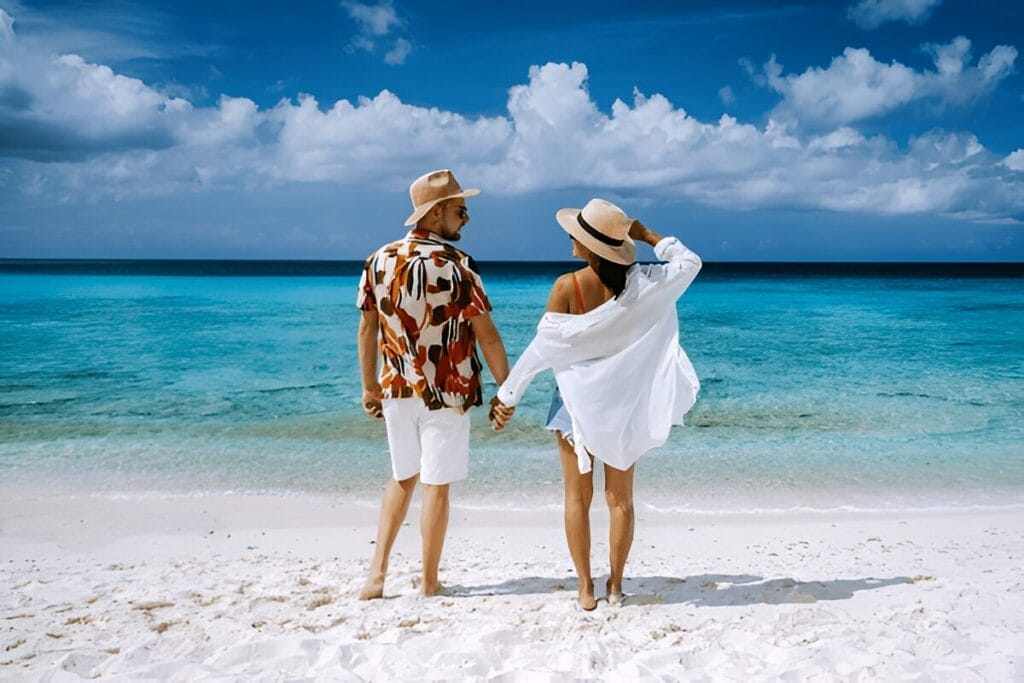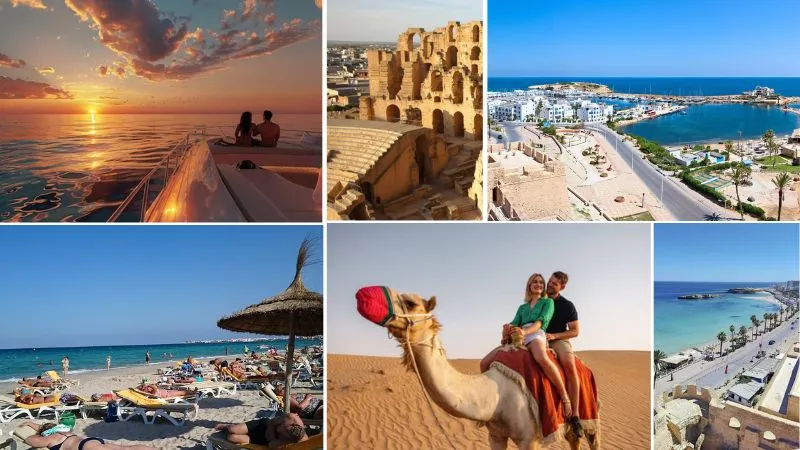Tunisia is a beautiful North African country with an enticing blend of ancient history, beautiful landscapes, stunning nature and a vibrant culture. With its rich heritage and diverse tourist attractions, Tunisia is an ideal vacation destination for those looking for a combination of leisure and exploration.
This Tunisia Travel Guide is here to assist you in navigating through the top must-see destinations, unique experiences, local culture and essential travel tips for you to have an unforgettable adventure. Tunisia is one of the best places to go for couples because it has serene beaches and amazing little towns like Sidi Bou Said.
Why Visit Tunisia?
Tunisia is an extremely special and unique country with a mix of history, culture, and breathtaking nature. In this guide to traveling in Tunisia, we’ll explore what makes it a favorite destination of travelers from around the world.
- Ancient History: Stroll amid the ruins of Carthage, one of the most powerful ancient civilizations, once rivaling Rome. Until then, picture the tales carved into the rocks of Dougga or gawk at the Roman amphitheater of El Djem.
- Idyllic Beaches: Home to Mediterranean hubs such as Hammamet, Mahdia and Djerba, Tunisia is heaven for beach aficionados. Chill by the turquoise water, or engage in blood-pumping water sports.
- Cultural immersion: Wander through navigable medinas, visit animated festivals and embrace friendly Tunisian hospitality. Any traveler will be mesmerized by the melting pot of Berber, Arab, and French influence.
- Honeymoons: The best place to go in Tunisia for honeymoons, with Djerba and Sidi Bou Said being ideal retreats for the romantic couple looking for a peaceful escape.
Top Destinations in Tunisia For Tunisia Travel Guide.
In this section of the Tunisia Travel Guide, we explore the must-visit destinations that showcase the country’s diversity:
Tunis: A marriage of the modern and the ancient in Tunisia’s capital. Explore the Medina, a UNESCO World Heritage site, and the Bardo Museum, the greatest collection of Roman mosaics in the world.
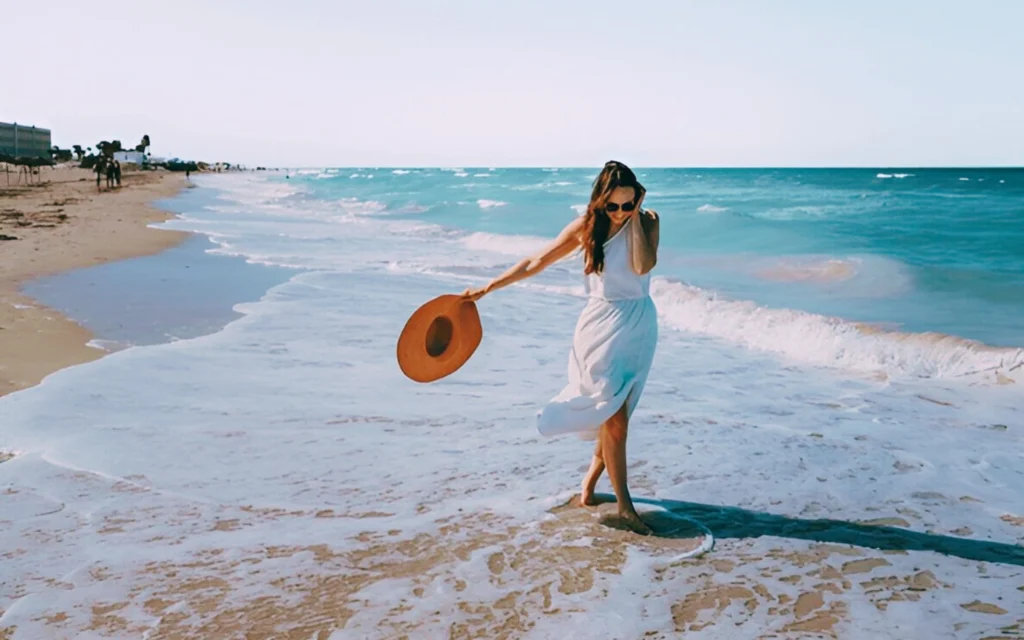
Sidi Bou Said: A blue-and-white wharf town, Sidi Bou Said is a romantic getaway for couples, featuring cobbled streets, chambers of art galleries, and spectacular views of the Mediterranean. Its romantic feel is one of the best things to do in Tunisia for couples.
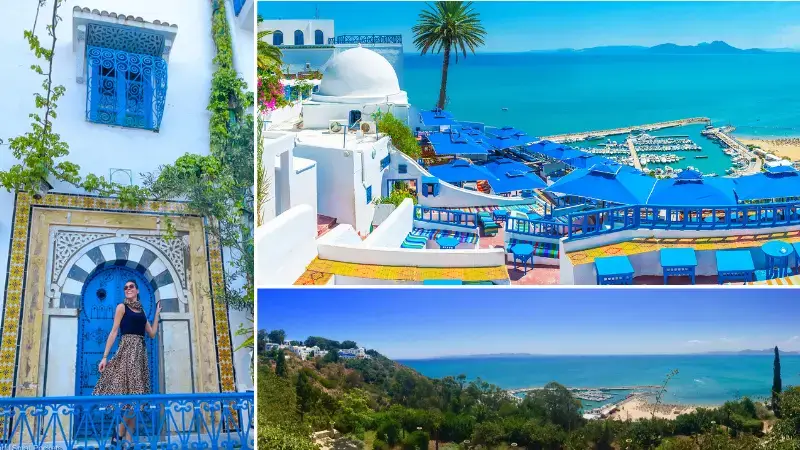
Djerba: Known for its beaches and rich cultural heritage, Djerba offers a blend of relaxation and exploration. Enjoy horse riding on the sand or visit the famous El Ghriba Synagogue.
Carthage: Explore the ruins of an empire with sites like the Antonine Baths and Byrsa Hill with its sweeping coastal vistas.
Tozeur and the Sahara Desert: Take cascades Adventures like camel rides, starlit camping and exploring Star Wars filming locations The golden sands of the Sahara are magical for couples and this is one of the greatest places to visit in Tunisia for couples.
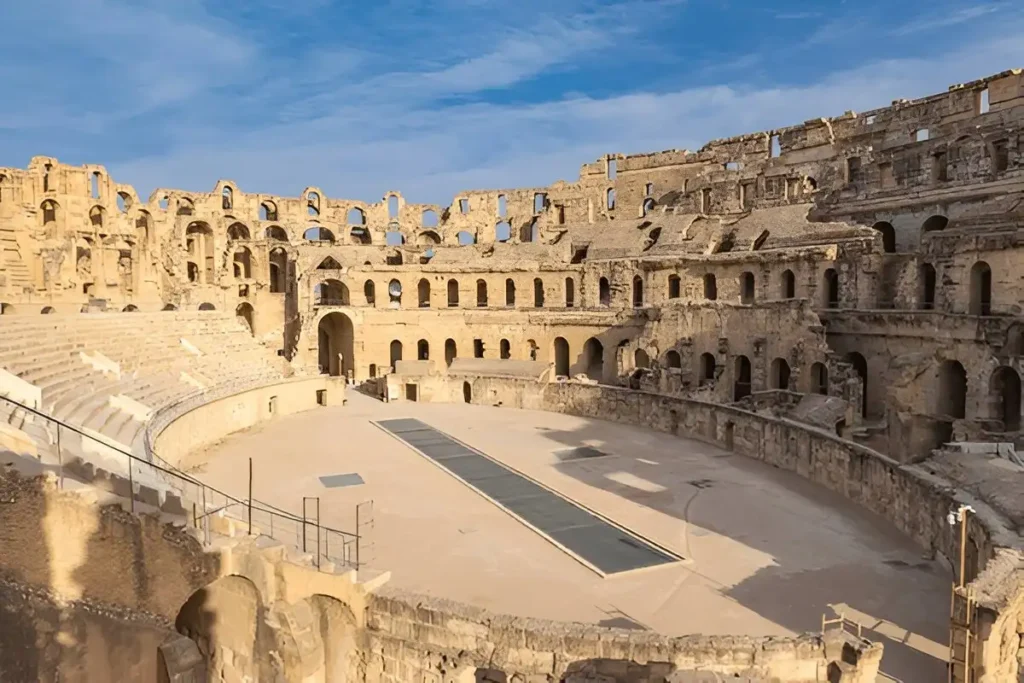
El Djem: This small town is home to one of the best-preserved Roman amphitheaters in the world. Constructed in the third century, the amphitheater once staged gladiatorial contests and seated more than 35,000 spectators.
Matmata: An interesting place for its troglodyte houses, where Berbers have lived for hundreds of years. The region became an international sensation in 1971 when it was the filming location of Luke Skywalker’s home in the Star Wars film.
Activities and Experiences
Tunisia is a birthplace of variation and excitements, a land of history, culture, adventure and relaxation, a gem that has a lot to offer for every kind of traveler. Tunisia has so much to explore and discover whether you’re a history buff, adventure junky, nature geek or simply a couple looking for romance. This Tunisia Travel Guide will help you make the most of your travels in this vibrant road-map, whether you’re looking to experience its rich culture, discover its stunning changing setting, or enjoy a sensational photoshoot.
Historical Exploration
Travel back in time as you discover Tunisia’s historical tapestry. Start with the Roman amphitheater at El Djem, a UNESCO World Heritage Site and one of the best-preserved Roman monuments in the world. Stroll Among Ancient Ruins Dougga, where temples, baths and theaters tell the stories of a bygone time.
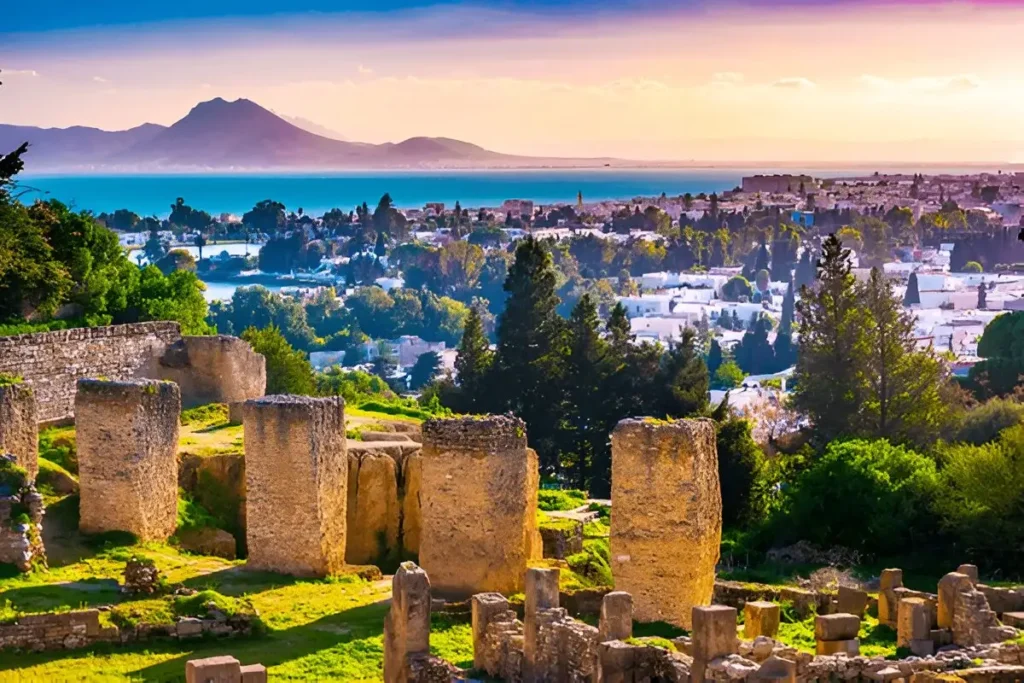
You can explore Tunisia’s history further by visiting Carthage, the fabled city of the Phoenicians. Explore the Antonine Baths, the Punic Ports, and Byrsa Hill, which has stunning views of the Mediterranean. The Medina of Tunis, with its maze of winding alleys and lively souks, is another place to go to experience the pulse of Tunisia’s living history. This Tunisia Travel Guide guarantees you will have a deeper understanding of the country’s rich history when you visit these sites.
Nature and Adventure
Tunisia’s varied, beautiful landscapes provide outdoor lovers countless opportunities for adventure.
- The Sahara Desert: Unveil the wonders of the Sahara through camel treks, sandboarding and 4×4 adventures across sweeping golden dunes. For an experience you won’t forget, spend a night in a luxury desert camp under a star-filled sky. The serenity and beauty of the desert make one of the best places to visit in Tunisia for couples come here to chill in the evening and you will have the most romantic time ever.

- Salt flats and oases: Visit Chott El Jerid, a stunning salt lake that shimmers in pink, white and blue. Nearby are verdant oases such as Tozeur and Ksar Ghilane, where palm trees and freshwater springs provide a tranquil refuge from the dry landscape.
- Hiking and Scenic Exploration: For the outdoorsy type, Djebel Chambi National Park offers several great hiking trails with stunning views of Tunisia’s landscapes. Ain Draham is an ideal destination for those searching for cooler weather, with its forested areas and picturesque views.
Romantic Escapes
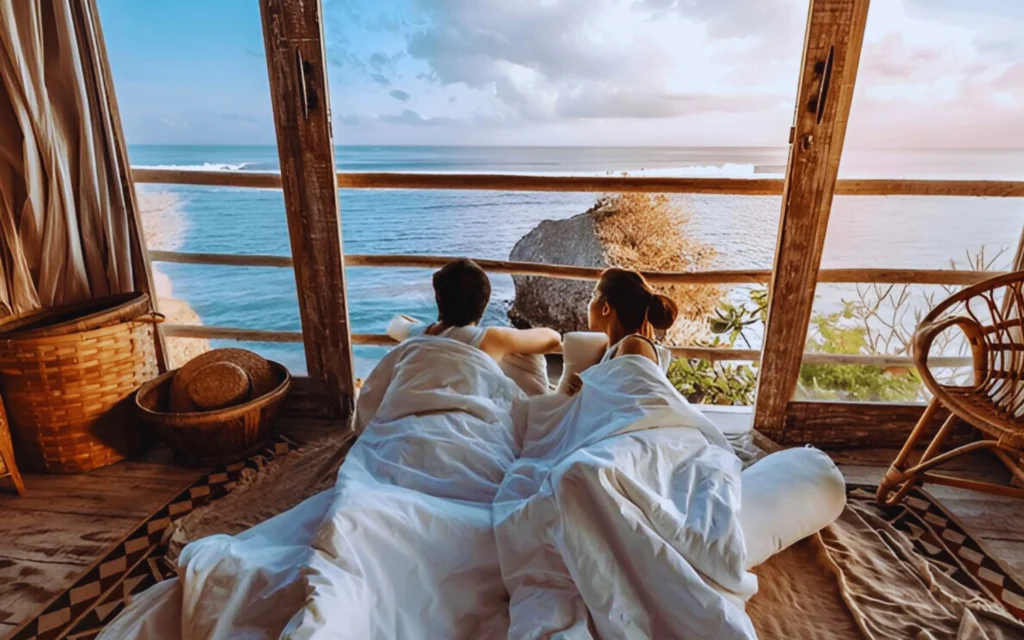
One of the most romantic places in Tunisia for couples full of activities and romance.
- Wander Sidi Bou Said, a photogenic village that showcases blue-and-white architecture and offers panoramic views of the Mediterranean. Savor mint tea on a terrace that overlooks the sea, or stroll through local art galleries, hand in hand.
- To get there, escape to the island of Djerba, where its tranquil beaches, quaint markets and luxurious resorts create the perfect setting for such a trip. Couples can also ride horseback along the beach or book a private sunset cruise.
- Hammamet with its golden beaches and laidback vibe is another romantic destination for couples. Savor candlelit dinners at beachfront restaurants or relax in tandem with a traditional hammam experience.
Cultural Immersion
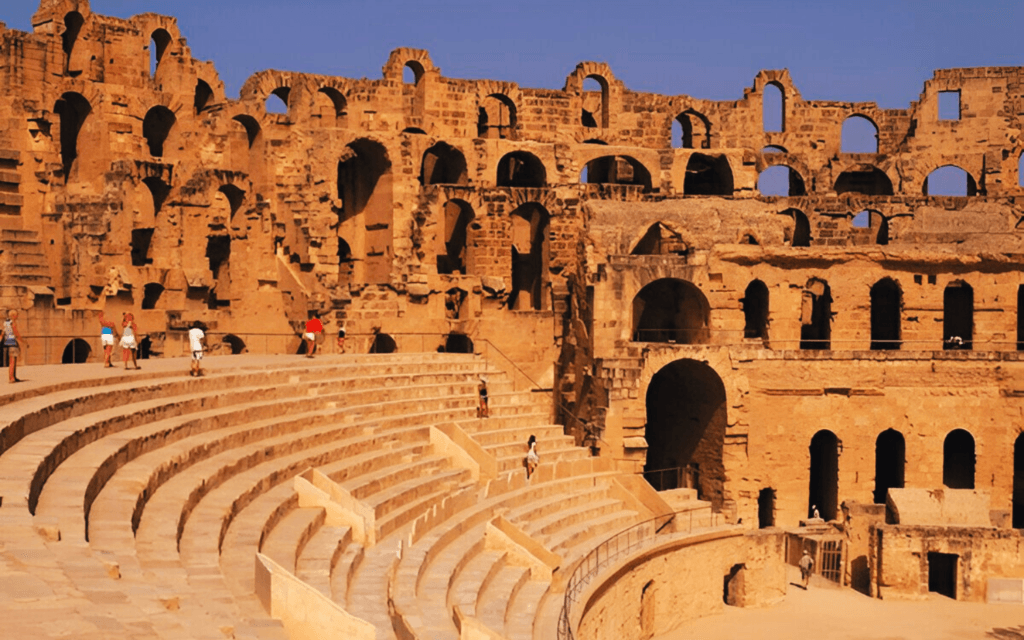
If you want to really understand Tunisia, immerse yourself in its rich and varied culture.
- Medinas and Souks: Stroll through the medinas of Tunis, Kairouan and Sousse, where you can explore lively markets with hand-made items, including ceramics, textiles and spices. Bargaining is part of a charm, so prepare to haggle with the welcoming local merchants.
- Festivals: Align your stay with one of Tunisia’s renowned festivals, such as the International Festival of the Sahara in Douz, where you can see camel races, traditional dances and Bedouin poetry. Carthage: The Carthage International Festival features music, theater and art at the site of ancient ruins.
- Traditional Experiences: Attend a local wedding celebration, learn to cook traditional Tunisian foods such as couscous or brik or take a pottery workshop in the village of Sejnane. These experiences provide a more in-depth connection to Tunisia’s heritage and citizens.
Culinary Adventures
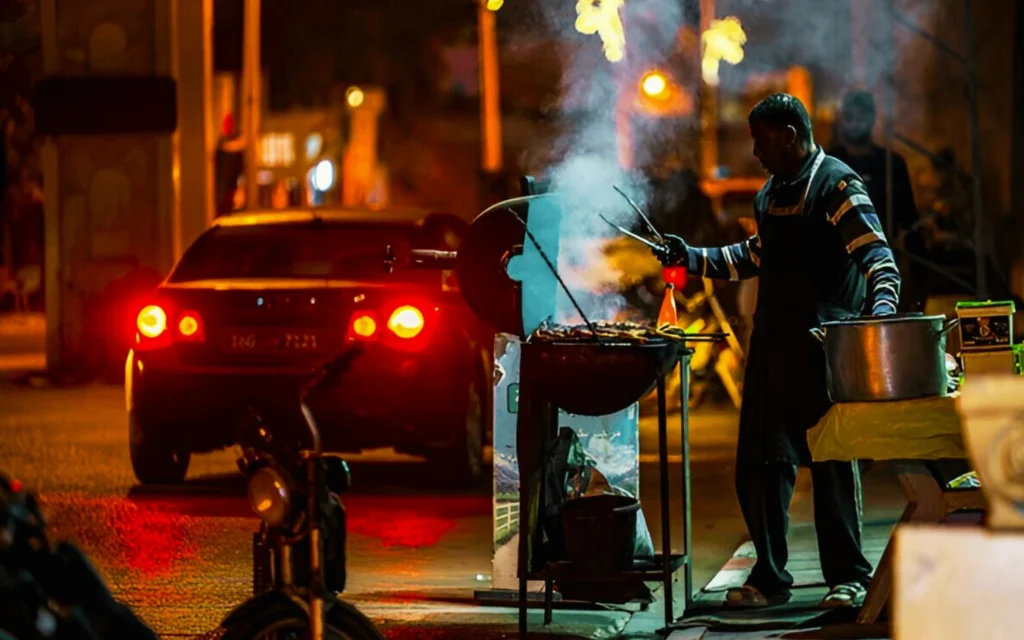
Tunisia’s cuisine is a sensory feast, merging Mediterranean tastes with North African spices.
- Street Food: Try local specialties such as lablabi (a hearty chickpea soup) or brik (a crunchy pastry filled with egg, tuna and herbs). Don’t skip the tabouna bread baked to order and served with olive oil and harissa.
- Seafood Delicacies: Coastal cities like Monastir and Mahdia offer fresh seafood. Gorge on grilled fish, octopus stew or poisson complet (whole fish) with a glass of local wine.
- Desserts: You might find sweet treats such as makroudh (semolina-based pastries with date filling) or bambalouni (sugar-dusted Tunisian donuts).
If you’re looking for a romantic meal, consider one of Tunisia’s beachfront restaurants or candle-lit spots with views of ancient sites. These food-visual evenings are among the best places in Tunisia for couples.
Best Time to Visit in Tunisia
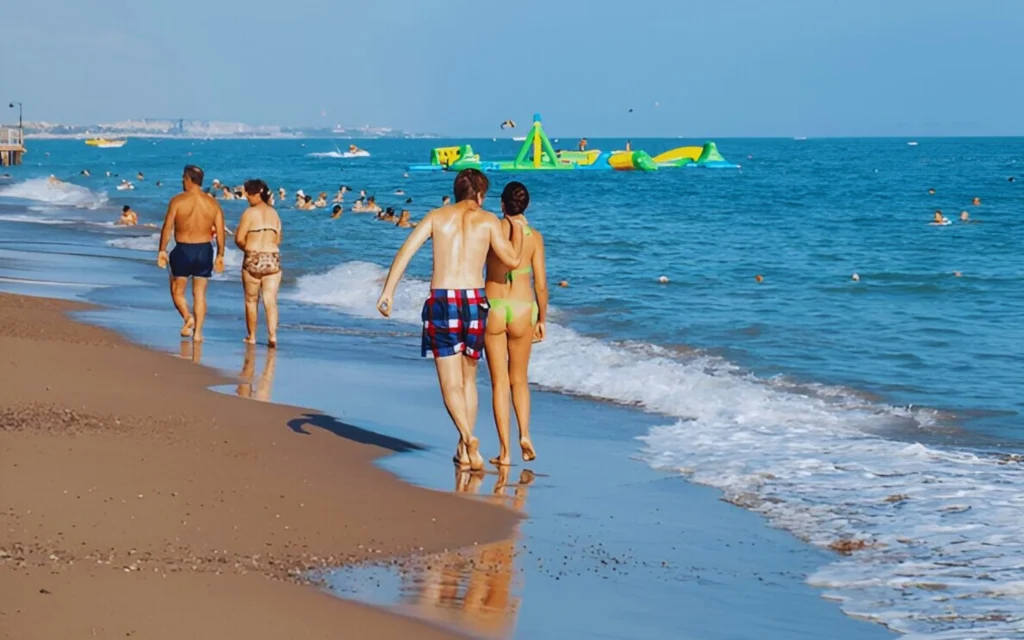
Timing is everything when planning your trip to Tunisia. This Tunisia Travel Guide will help you decide the best time for you to see the wonderful and diverse array that this country has to offer. With a Mediterranean climate, summers are warm and sunny and winters mild, though each season has its perks for certain kinds of travelers. Our guide gives travellers looking to experience any of these regions a brief overview of when the ideal time is for them to familiarize themselves with the sights in question.
Spring (March to May)
Spring is one of the best seasons to visit Tunisia. The weather is nice, from 15°C – 25°C (59°F - 77°F). The countryside is lush and blooming, so it’s a welcome time to explore the country’s natural beauty and historical sites.
Why Visit in Spring?
- Walk through the ancient ruins at Dougga or Carthage without the stifling summer heat.
- Go hiking in Jebel Chambi National Park, where trails are covered with wildflowers.
- Beaches such as Hammamet and Mahdia are less touristy, ideal for couples wishing for romantic solitude. that is the reason spring is one of the best places to visit in tunisia for couples.
Summer (June to August)
Tunisia’s summer is ideal for beach-type travelers, with coastal regions such as Djerba, Sousse and Hammamet enjoying sunshine. Temperatures can reach above 30°C (86°F), particularly inland and in desert areas, but coastal areas are much cooler due to the Mediterranean breeze.
Why Visit in Summer?
- Relax on white sandy beaches, swim in the turquoise waters or try exciting water sports such as windsurfing or jet skiing.
- Discover islands like Djerba with resorts and hotels offering top-tier amenities, perfect for honeymooning and couples alike.
- Use long daylight hours to explore busy medinas, shop in souks or drink mint tea in seaside cafés.
Tips for Summer Travelers:
- Just stay near the coast and you will avoid the choking heat of the Sahara.
- If you plan to be outdoors, do so in the morning or evening when it is more comfortable.
Autumn (Sept to Nov)
October and November: Autumn is also a great time to travel in Tunisia, with temperatures of 20°c to 28°c (68°f to 82°f). The weather remains warm, but summer crowds have present a bit, making it a good time to visit both beaches and inland attractions.
Why Visit in Autumn?
- The sea is still warm from summer, making this a good time to swim or unwind on the beaches of Hammamet (above) and Monastir.
- Discover Tozeur and the other oases of the Sahara desert, where the cooler weather helps to make outdoor activities such as camel trekking more bearable.
- Others attend festivals such as the International Festival of the Sahara in Douz, which showcases Bedouin culture and traditions.
- Couples will find there is an air of tranquillity in autumn destinations like Sidi Bou Said cements its position as one of the best places to go in Tunisia for couples.
Winter (December to February)
In Tunisia, winter is mild (between 10° C to 18° C, or 50° F to 64° F). This is such an off-peak that those looking are rested at the prices while taking in the benefits of fewer crowds.
Why Visit in Winter?
- Explore historical sites such as El Djem and the Medina of Tunis without the crowds.
- Discover desert dunes of the Sahara desert in cooler months when daytime temperatures are pleasant for wandering, and evenings are ideal for curling up in desert camps.
- Coastal cities such as Tunis, Sousse and Djerba enjoy good weather perfectly suited for sightseeing or simply taking nice long walks by the sea.
- During Syso, couples can indulge in intimate activities, such as hammam treatments or romantic dinners overlooking the Mediterranean, which is why winter is one of the best places to go in Tunisia for couples.
Month-by-Month Guide
- March to May: Ideal for history fans and nature lovers.
- June to August: Ideal for beach holidays.
- From September to November: If you are a couple and seeking adventure.
- December to February: Good for budget travellers and people looking for peace and quiet.
This Tunisia Travel Guide will ensure you will travel at the best time to discover the best out of what Tunisia has to offer, considering season, weather, and the activities you want to experience. Springtime hikes, summer beaches, autumn festivals and winter serenity, Tunisia gleams all-year.
Practical Tips for Travelers
Essential Practical Tips for Visitors to Tunisia travel guide This Tunisia Travel Guide contains essential practical tips that will ensure that your travel to Tunisia is seamless and without stress. From entry requirements to local customs, these insights can help you navigate the country seamlessly, allowing for a safe and enriching experience. From first-timer to seasoned traveller, knowing all this will help you immerse yourself in the culture and attractions of Tunisia.

Entry Requirements and Visas
- Visa : Citizens of many nationalities (including EU, USA & Canada) do NOT need a visa for stays less than 90 days But the latest requirements can change before your trip.
- Ensure Your Passport is Valid: Make sure your passport has at least 6 months validity beyond your dates of travel.
- Travel Insurance: Having travel insurance that covers medical emergencies, cancellation, and other unexpected events is highly advised.
Currency and Payments
- Currency: The official currency is the Tunisian Dinar (TND), a closed currency, which means it cannot be exchanged outside Tunisia.
- Changing Money: You can easily get money exchanged at airports, banks, and big hotels. ATMs can be found in cities but take cash in rural areas.
- Credit Cards: Many hotels and restaurants in the tourist areas will accept cards but not in local markets or most small places.
Tip: Never trade money on the road; use authorized change houses for better rates and security.
Transportation Options
- Taxis: Taxis are cheap and readily available in urban areas. Make sure the driver turns on a meter or negotiate a fare in advance.
- Louages: Louages, shared minivans, are a cheap way to get from city to city. They depart when full, so expect to wait a bit.
- Car Rentals: It is better to rent a car especially if you are going to remote locations. This will give you more flexibility going around, particularly if you are going to Dougga or the Sahara Desert.
- Train: Tunisia’s train system is economical and effective, linking the big towns, such as Tunis, Sousse and Gabes.
- Driving Tip: Exercise caution while driving, as road conditions vary, and local driving styles can be erratic.
Language Basics
- Official Languages: Arabic is the official language, but French is widely spoken because of Tunisia’s colonial past. In tourist areas, you will also find English speakers.
- Basic Phrases: It pays to know a few local phrases in Arabic or French, the two official languages of Tunisia. For example:
- Hello: As-salaam alaykum (Arabic) or Bonjour (French)—
- How to say thank you: Shukran (Arabic) or Merci (French)
- How much? : Biqadash (Arabic) or Combien? (French)
Health and Safety
- Health Precautions: Tunisia is relatively safe, and drinking bottled water and avoiding raw or undercooked food is the best way to avoid stomach problems.
- Healthcare Infrastructure: Urban areas have quality hospitals and clinics; rural regions might lack adequate healthcare services. Medical emergencies are covered by travel insurance.
Safety Tips:
- Do not flaunt any expensive jewelry or large amounts of cash in public.
- If you are in crowded place, be careful and keep an eye on your belongings so you don’t end up getting pickpocketed.
- Keep abreast of local events, and stay clear of any spots of political action.
Local Customs and Etiquette
- Dress Code: Tunisia is a Muslim country, so modest clothes are advised, particularly when going to religious sites or rural areas. Beachwear is permitted in coastal resorts, however.
- Photography: If you want to take photos of people, ask first and be especially sensitive in rural or traditional areas.
- Tipping: Tipping is expected in most places, particularly in restaurants, taxis, and for tour guides. A tip of 10% is appreciated.
- Ramadan: Be aware that many locals will be fasting if you travel during Ramadan. And, as a sign of respect, abstain from eating, drinking or smoking in public during daylight hours.
The process of communication and gaming Technologies.
- Wi-Fi: Hotel, cafes and airport free Wi-Fi is standard, though speed can be slow in rural places.
- Mobile Connectivity: Local SIM cards with data plans are very cheap and available at the airport or mobile shops. Big providers are Tunisie Telecom, Orange and Ooredoo.
Emergency Numbers:
- Police: 197
- Ambulance: 190
- Fire Brigade: 198
Budgeting Tips
Tunisia is an economic country to traveling in, though by knowing where and how to spend your money you may maximize your visit.
- Accommodation: Use everything from the high-end hotels to backpackers.
- Food: Eat cheap and hearty at local restaurants and street food. You’ll find fine dining at more upscale venues in major cities and tourist areas.
- Attractions: Most historical sites charge little to no money for entry (approximately 40 rubles, or about 50 cents, at St. Petersburg’s Peter and Paul Fortress); guided tour prices are also fair.
- Tip: For tipping and small purchases, be sure to have some small change in dinars as larger notes tend to not always be accepted.
Conclusion
Tunisia is a country where you discover something new each day. Due to its rich history, breathtaking views, and romantic getaways, it’s no wonder it’s considered the best place to visit in Tunisia for couples. Use this Tunisia Travel Guide as inspiration for your next getaway to a place where magic happens at every turn. So pack your bags, because we’re about to take you on a romantic, cultural experience that you will remember for a lifetime!

